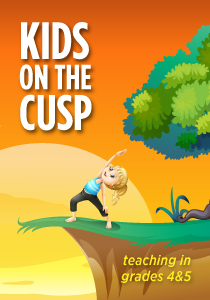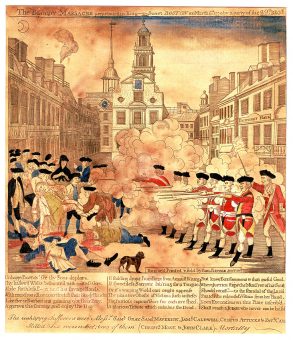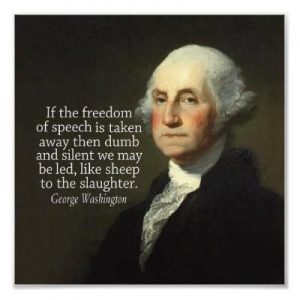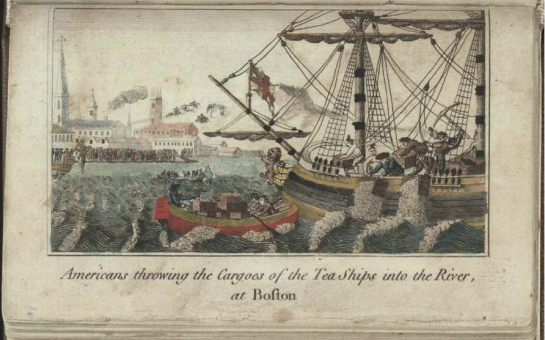Teaching the Revolution in a Pearson World
A MiddleWeb Blog
 Perhaps the most important lesson I can teach my students is to look back on the past, to see what we can learn from it. If they are encouraged to look back, maybe they will see how the main ideas of history share a common theme. Perhaps they will begin to grasp the true implications of what they find…and to connect these ideas to the world today.
Perhaps the most important lesson I can teach my students is to look back on the past, to see what we can learn from it. If they are encouraged to look back, maybe they will see how the main ideas of history share a common theme. Perhaps they will begin to grasp the true implications of what they find…and to connect these ideas to the world today.
And the quests for power, land, riches, and liberty, along with the freedom to pursue the things that we value, are important pieces of history to look at. These quests give us an opportunity to look at yesterday’s choices and yesterday’s motives, and to form opinions about the history that we are making today.
Exploring the American Revolution
As we wrap up our studies of American History, we leave off at the Revolution. It’s an amazing topic to teach, and the 41 fourth-grade kids I explore it with each week continue to be engaged and full of questions. This is a good thing. I hope to leave them with even more questions when they forge ahead to fifth grade.
As we explored the motives and conquests of the past, the kids made some big connections and posed some insightful questions. Fourth graders make great comments and ask big questions with such simplicity.
“That’s not fair!”
“Why didn’t somebody do something about it?”
Right now we are combining several resources to finish up our year, as the Revolution unfolds and the cry from the colonists – the cry for their voices to be heard – is ringing out across the land.
I can relate.
Some of the connections that I make outside the classroom, however, are connections that I don’t share with my fourth graders. That would be detrimental to the cause. I don’t want to incite rebellion. I want to be part of the solution, helping kids become thoughtful citizens of an ever-changing world.
History repeating itself, in American education
When I look at the current practices of standardized testing and student evaluation, I see history repeating itself. And like a voiceless colonist, my frustration grows.
Pearson Education has a monopoly on American education, and that troubles me. According to my friend Merriam (who was first published in 1806), a monopoly is a company that has “complete control of the entire supply of goods or of a service in a certain area or market.”
Pearson’s monopoly causes a windstorm of questions to begin swirling around in my head. Perhaps the worst part is the uncomfortable shroud of secrecy that is so pungent in the air blowing across America’s current landscape. It doesn’t smell very good.
In the immortal words of Benjamin Franklin, “A lie stands on one leg, truth on two.”
Pearson is in the business of making money, and they are entitled to that right as a private, global firm. This is one of many liberties granted to those who conduct business in America, and many hard-working people are employed by Pearson. But having a corner on the market, having a monopoly on the United States education system (on any system, for that matter), needs looking at…out in the open air.
Beyond the monopoly
The United States government has spent hundreds of millions of dollars on Pearson products. Some of them may prove to be useful down the road, but ironically it’s the free resources available to me that best serve to enhance my teaching.
Three resources in particular have had a startling effect on my students. They are so enjoyable, engaging, and fun that I almost feel guilty using them. Then I remind myself that our Constitution guarantees us the right to “life, liberty, and the pursuit of happiness.”
My own golden triangle of free resources
► For Crown or Colony is a PBS interactive that enables children to step into the shoes of a young apprentice in Colonial America. We walked together during the course of five class periods, and the response was incredible. After watching the introductory prologue, they were all hooked.
► Liberty’s Kids
► Our third tool of study has been a class favorite for years, the Walking Classroom. By walking and listening to biographical podcasts about Ben Franklin, Patrick Henry, and Crispus Attucks, as well as topics such as the Boston Massacre, the Boston Tea Party and the Intolerable Acts, we gained multiple perspectives on the past.
This link has a free sample of “The Boston Massacre” podcast to listen to, as well as sample lesson plans and discussion topics. It addresses peer pressure and good decision-making too! Paul Revere’s engraving, projected on our interactive white board while we listened, simultaneously gave us perspectives on the incident from two very differing vantage points.
By taking a look at many perspectives throughout our year together, my “almost 5th graders” have learned a great deal about the past. I wonder what they will do with it as they walk forward to make history of their own.
Free speech today
Maybe this whole Pearson/PARCC thing is the ultimate pay back for the Revolutionary War. They are a British firm, and, as far as American educational resources and testing are concerned, they really do own us again…. At least in New Jersey they seem to.
Didn’t the Dutch East India Company try to have a monopoly on tea imports way back when?
Now, I’m not suggesting that we dump their tea, but we don’t have to buy it. Isn’t that part of the story of how we got started as a country in the first place?

Revisiting the Founders’ wisdom
Thankfully, we no longer need men on horseback galloping through the night with secret warnings and messages about the arrival of the British, but we do need to learn from the past.
Maybe those who came before us said it best:
“Children should be educated and instructed in the principles of freedom.” ~ John Adams, Defense of the Constitutions, 1787
“A morsel of genuine history is a thing so rare as to be always valuable.” ~ Thomas Jefferson, September 8, 1817
Image credits:
Above: Thowing the Cargoes of the Tea Ships into the River: W.D. Cooper, 1798. [Public domain], via Wikimedia Commons
Above and feature image: Boston Massacre by Paul Revere (1735–1818) [Public domain], via Wikimedia Commons




































Several years ago I was teaching a 4th grade lesson in heroism using Houghton Mifflin materials. HM is connected big time with the Bush family. The textbook’s example of a “hero” was also a Jeb Bush donor. Her heroic gesture was donating $200,000 to a Florida hurricane fund.